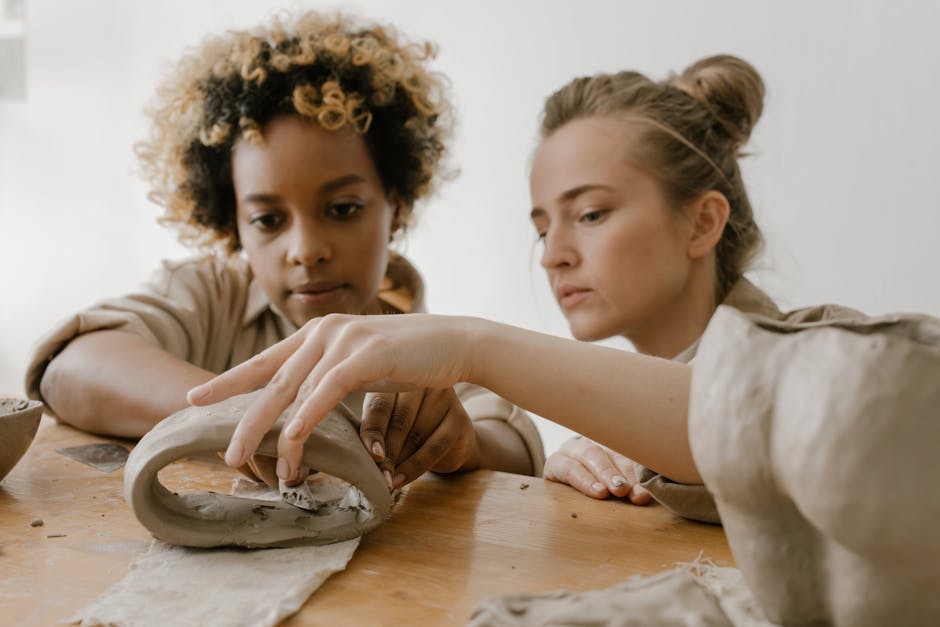The allure of pottery, shaping clay into tangible art, is undeniable. For many, the idea of creating unique pieces, imbued with personal expression, sparks a fervent desire to try their hand at this craft. A critical question arises: can you truly master the intricacies of pottery entirely on your own, or is a structured class indispensable? This exploration delves into the pros and cons of both approaches, offering insights for aspiring potters seeking a pathway to their artistic dreams.
The independent route: navigating the uncharted territories of clay
Undeniably, a significant advantage of self-teaching lies in the flexibility it offers. Time constraints, geographical limitations, or scheduling conflicts can all be overcome by opting for self-directed learning. Online resources, from meticulously detailed YouTube tutorials to comprehensive websites housing digital clay workshops, are readily available, offering a wealth of information at your fingertips. These resources can cover fundamental techniques, various clay types, and even advanced methods, all accessible at one’s own pace. Furthermore, self-learning provides a profound sense of autonomy. You chart your own course, experimenting with different shapes, glazes, and techniques, and ultimately, determining your own artistic style. This freedom to explore unhindered can be enormously liberating and invigorating for those who thrive on self-discovery.
However, a crucial aspect often overlooked in self-teaching is the lack of direct guidance. Mastering techniques like throwing on the wheel or achieving flawless surface finishes can be challenging without the immediate feedback of an experienced instructor. Learning from mistakes through practice alone can be a lengthy and sometimes frustrating process. Identifying and rectifying errors in technique might prove difficult without expert guidance.
The structured classroom: learning from the wisdom of others
Pottery classes, on the other hand, provide a structured environment with invaluable benefits. Experienced instructors offer personalised feedback, helping to refine techniques and correct errors in real time. Hands-on demonstrations, combined with direct guidance, facilitate rapid learning progress. The structured environment often fosters a supportive community. Sharing experiences and insights with fellow students creates an inspiring atmosphere and allows for the exchange of knowledge, ideas, and techniques. This collaborative learning environment helps aspiring potters to connect with like-minded individuals, build a supportive network, and find inspiration in the work of others. Crucially, classes offer a safe space to experiment and make mistakes without the fear of making irreversible errors.
A significant drawback to structured classes is, of course, the cost and time commitment. Classes often require a fixed schedule, potentially conflicting with other commitments. Financial considerations can also deter individuals from pursuing this educational avenue. The availability of classes near one’s location can be another factor limiting accessibility. Further, some students may find the structured atmosphere constraining, rather than nurturing, potentially affecting the freedom of their creative expressions.
The hybrid approach: synergizing self-study with structured learning
A balanced approach, integrating self-study with structured lessons, often emerges as the most effective route. Using online resources to grasp fundamental concepts and build a foundational understanding can then be complemented by periodic participation in workshops or classes. Such an approach leverages the strengths of both methods, optimizing learning outcomes. Attending a few classes can provide crucial mentorship, allowing for personalized feedback on technique and potentially introducing you to new materials and inspiring fellow artists.
Ultimately, the best pathway depends on individual learning styles, resources, and objectives. If you’re a motivated learner comfortable with self-directed study and possess the discipline to seek feedback independently, self-teaching can be viable. However, if you thrive in a supportive environment, value personalised feedback, and desire rapid progress, joining a pottery class is a powerful option.
Key factors to consider when deciding:
* Learning style: Are you a visual learner who benefits from seeing demonstrations, or a hands-on individual who prefers immediate practice?
* Available resources: What online materials are accessible to you, and what’s the availability of local classes?
* Financial constraints: How much can you afford to invest in classes or materials?
* Time commitment: How flexible is your schedule, and how much time can you dedicate to learning?
The path to pottery mastery is not one-size-fits-all. It is a journey tailored to individual needs and aspirations. Either way, be prepared for the rewarding journey of shaping clay into something uniquely beautiful and personal. Pottery, after all, is a testament to the power of creativity and self-expression, regardless of the path you choose.






